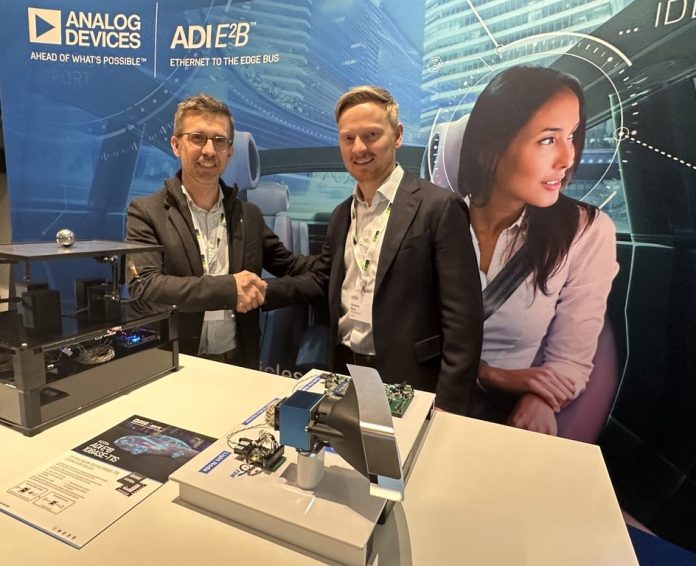Analog Devices, Inc. and the BMW Group has announced an early adoption of E²B, ADI’s 10BASE-T1S Ethernet to the Edge bus technology within the automotive industry. Automotive Ethernet connectivity is a key enabler of new, zonal architectures in automotive design and supports automotive megatrends such as software-defined vehicles. The BMW Group will be a leading original equipment manufacturer (OEM) to implement the technology, leveraging ADI’s E²B for their ambient lighting system design in the vehicles of the BMW Group in the future.
Since 2018, ADI has been working closely with the BMW Group on a new concept to simplify bringing Ethernet to the Edge. At the same time, the IEEE802.3cg Group was defining a new 10Mbps Ethernet standard called 10BASE-T1S, with ADI and the BMW Group among other companies both actively involved. Using ADI’s 10BASE-T1S E²B technology to remove microcontrollers and move software from edge nodes to central processing units, the BMW Group enables an all-hardware edge node while reducing software development and qualification tasks.
“While working alongside ADI on 10BASE-T1S E²B, we joined efforts on a number of key considerations, from simplifying implementation, to cost analysis and design support. The relationship with ADI has enabled us to move more quickly to market with a solution of a zonal architecture for software-defined vehicles,” the BMW Group stated.
“We continue to deeply engage with the BMW Group to understand their next-generation needs and bring further optimized products to aid next-generation architectures, as well as bring continued cooperation on standardization,” said Yasmine King, Vice President, Automotive Cabin Experience at ADI. “10BASE-T1S E²B is a great new addition to our automotive connectivity and networking portfolio, innovated to drive success across different use cases, with the flexibility and scalability to support zonal, domain and hybrid architectures.”
In-cabin experience continues to be a critical focus for automakers, with driver and passenger expectations becoming more refined. This is especially true of the ambient lighting within the vehicle.
However, many of today’s lighting solutions are complex to implement, use legacy technologies, and are difficult to scale and update as the number of supported LEDs increases. By leveraging the 10BASE-T1S with E²B technology, OEMs can provide a rich customer experience while also synchronizing lighting with other applications in the vehicle. Fully enabling a software-defined lighting system provides improved flexibility, ease of upgrade, and ease of use.
“This approach to edge connectivity is so sought-after that the automotive industry inside the Open Alliance (opensig.org) is now aiming to standardize a similar solution. ADI, along with the BMW Group and other companies, are actively working with the industry to create an Open Standard implementation,” said Yasmine King.








